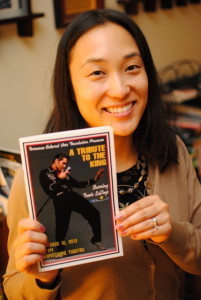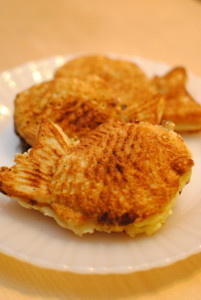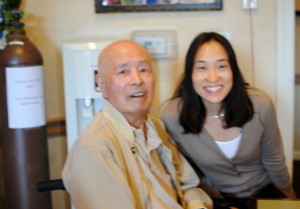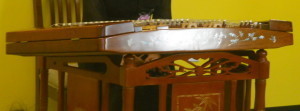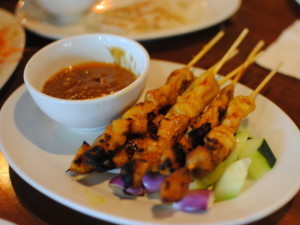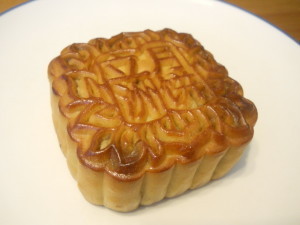Jennifer J. Chow's Blog, page 69
October 14, 2013
Serenaded by the King
“Distance tests the endurance of a horse; time reveals a man’s character.” -Chinese proverb
Sometimes I feel like I’m an older soul trapped in a younger person’s body. I’ve always felt this way. Maybe it’s the fact that I’m more reserved and cautious by nature, or that I’m fascinated by earlier times. I like listening to “oldies” music, particularly songs from the 1950s. So when there was a chance for me to attend an Elvis tribute concert, particularly one touted “as the closest thing to young Elvis I have ever seen” by one of Elvis’ contemporaries, rocker Johnny Rivers, I jumped at the chance.
It was beautiful sitting in the smooth velvet seats of the theatre looking at the gleam of the polished instruments on stage. Then when Elvis (Travis LeDoyt) came in the spotlight, I loved tapping my toes to the beat and singing along with favorites like, “Jailhouse Rock,” “Little Sister,” and “Blue Suede Shoes.” In the middle of the concert, though, I noticed that something was missing. It had nothing to do with the exemplary routine, though. It was something more personal. (It also wasn’t the fact that LeDoyt came into the aisles and interacted with the crowd, and I froze up when I got serenaded.)
Then I put my finger on it. A lot of the reason I enjoy Elvis Presley is my memories of listening to his songs with my mom. It was a way for us to connect, even without talking. Although I still enjoyed the show very much, I realized that I was missing that beautiful bonding experience with my mom that made the songs that much sweeter and more memorable.
October 11, 2013
Liebster Award
Hello, all! Here’s a secret post for everyone because I received a recent Liebster Award nomination. Thank you to Evelyne Holingue! (I realize that when I migrated from Blogger to my custom site that I didn’t display my previous blog awards. I’ve since remedied this–see the sidebar!)
I first received the Liebster Award when my blog was starting off. I’m excited to get the nomination again. Here’s some background on the award by Evelyne:
“Liebster comes from the German verb Lieben, which means to love. Liebster is the superlative form of the adjective lieb, which means kind, likeable, lovely. As a noun liebster also means sweetheart and boyfriend. Ah the complexities of the German language!
As I understand it, the Liebster Award is like a little gift from one blogger to another.”
I’ll post the rules for the award and then answers the questions given to me.
The Rules:
1. Write a post about the nomination and link back to the nominator’s site.
2. In that post, explain the meaning of the award and answer the questions given to you.
3. Create questions for your nominees.
4. Nominate 5 blogs with fewer than 1000 followers.
5. Contact nominees and let them know that you have nominated them.
6. Post the award button on your blog.
My Questions:
Do you remember your first blog post?
My first post ever was about the fox demon. I started this blog by looking at Cantonese phrases and seeing how they intersected my life.
Why are you blogging?
I started my blog as part of a writers’ platform challenge from Robert Lee Brewer.
What do you like best and least about blogging?
It’s still amazing for me to see my words in print right away! On the flip side, the quickness makes me need to constantly create for new posts.
What blogs do you like to follow?
I have a penchant for writing blogs. However, I will also venture into different topics if I enjoy the blogger’s voice.
What would you like to share with your readers that they might not know about you?
I’ve always wanted to go to Prince Edward Island because of the Anne of Green Gables series.
If money, job and family weren’t an issue where would you live and why?
I don’t know. I really like California because it has a variety of landscapes and lovely weather.
Have you learned more from your successes or failures?
From my failures. The rejections push me to work harder and improve my craft.
What is your idea of a day lived to its fullest?
My ideal day would involve writing, reading, hanging out with family, and spending some time outdoors.
What one key message do you want your readers to take away from your blog?
I would like readers to be more appreciative of different cultures and their own background.
Do you prefer the book to the movie or the movie to the book?
The book, of course.
My Nominees (*by the way, feel free to pick and choose from any of the above questions to answer):
1. Trace‘s blog has it all with its three components of create, live, and style. You can find tips on fashion, crafts, interior decorating and more!
2. Writing Wings gives you an inside look on one novelist’s journey.
3. YA Multicultural Junkie–the blog title says it well. Let’s keep celebrating diversity!
4. Panda Ninja loves Asian fusion and books! Come for the cute graphics and stay for the writing tidbits.
5. Dara the Writer has a great sense of humor. Follow her unique posts as she embraces being “a writer.”
Foodie Friday: Fish-Shaped Pancakes
Fish-shaped pancakes: traditionally known as taiyaki, and filled with sweet red bean paste
I remember visiting night markets in Taiwan and getting these amazing pancakes. They come in all sorts of shapes, but different types of animals were the most popular ones. (In fact, I enjoyed the experience so much that I referenced it in my novel.)
In the United States, you can buy your own waffle maker–or pancake maker (see a Hello Kitty machine here). The fish-shaped pans can be bought at Japanese grocery stores, like Marukai. Why the popularity of fish? In Japan, fish can mean well-being; they can also symbolize fearlessness, since a koi can swim upstream against the current. In the Chinese culture, the words for “fish” and “abundance” are so similar that eventually fish became associated with wealth.
Back to the food, though. What’s better than finding a machine and making your own pancakes? Having someone else cook the treat for you. That’s why I found myself at Oko Cafe in Gardena, watching golden batter being poured into a pan.
Now I prefer my pancakes plain, but these were offered with the traditional red bean filling and some items more attuned to the American taste: chocolate, egg custard, and chocolate with bananas. Standing there, I was reminded of my previous night market experiences. I loved the dim surrounding, contrasted with the bustle of cooking and the crafting of food right before me. Enjoy the magic, too:
October 9, 2013
First TV Interview
I promised to update you when my TV interview went live. (Remember my post about my fashion makeover?) Enjoy the clip!
October 7, 2013
Reading at a Senior Home: One Elder’s Reaction
“A single spark can set a prairie on fire.” -Chinese proverb
This saying, although centuries old, is closely associated with an essay entitled, “A Single Spark Can Start a Prairie Fire,” by Mao Zedong. In his document dated January 5, 1930, he talks about his idea to win over the masses and ensure a successful revolution. He urged the conquest of rural areas and having “an armed independent regime of workers and peasants” before surrounding the cities and taking over the government. His tactics were so solid that they led to the success of the Communist leadership in China. The defeated government landed in Taiwan, and the Kuomintang took over the island. Unfortunately, there was unrest after the takeover, which led to the killing of numerous Taiwanese citizens. The start of this terror is known only by three numbers, 2-2-8 (it all started happening on February 28, 1947). This incident and the events afterward, particularly how this trauma translates down through the generations even decades later, inspired my novel, The 228 Legacy.
I had a chance to recently read to a group of elderly at a local senior home. It was a small, intimate setting where I read excerpts from my book and held a Q&A discussion afterwards. One man, Eugene, took one look at the book’s title and said, “I know what 228 is.” He then recounted his experience of being a high school student during that tumultuous time. He kept repeating about how they “had to hide” because they were all afraid of the gunshots ringing in the air outside.
I later spoke to the Activities Coordinator of this senior home. She mentioned that Eugene doesn’t usually speak up and isn’t interested in a lot of the activities. She was excited to see the animation in his face when he saw my book. I’m hoping I set off the single spark in his life that will lead to a journey of healing for him.
Have you ever set off a spark, and how?
October 4, 2013
Foodie Friday: Sao Bing
Sao bing: baked and layered flatbread
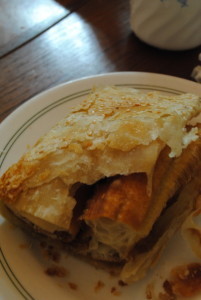
This version has youtiao (Chinese doughnut) in the middle.
What is your ideal breakfast spread? Is it a stack of pancakes, fluffy and moist, served with maple syrup? Maybe a pile of strawberries on the side?
In Taiwan, the traditional breakfast is sao bing. It’s a baked bread made with flaky layers. The ones sprinkled with sesame add a nice crunchy taste. They’re generally eaten with some warm soymilk.
They’re the flavor of comfort; they taste like sleeping in and lazing around on a Saturday morning. I even have a friend who buys frozen versions from Taiwan to bring back to the United States. You can’t put a price tag on foods that are associated with love and comfort.
What foods make you nostalgic?
September 30, 2013
The Chinese dulcimer
“Crows are black the world over.” -Chinese proverb
What would I consider to be a universal language? Music. Wherever you come from, you can appreciate the wordless art. This past weekend, I had a chance to listen to a Chinese hammered dulcimer.
Hammered dulcimers, like those black crows, exist all over the world. They are instruments with strings stretched across a trapezoidal sounding board and are played with small mallets (hammers). The name dulcimer comes from the Latin dulcis (sweet) and the Greek melos (song). Versions of the musical instrument are played in India, Iran, Southwest Asia, China, parts of Southeast Asia, Central Europe, Switzerland, Austria, the Balkans, Eastern Europe, Scandinavia, the United Kingdom, and the U.S.
The Chinese version of the hammered dulcimer is known as the yangqin. The strings (over 100 of them!) can be made from bronze, although older versions use silk. The mallets are made from rubber-tipped bamboo sticks. The yangqin can be played solo or in group performances.
I haven’t tried my hand at the yangqin, but I did attempt to play a guzheng, which is a plucked zither. It has over 18 strings and moveable bridges. I wanted to be like those maidens in the old Chinese dramas. Of course, I didn’t come close to creating any type of beautiful music.
Don’t worry. I won’t make you suffer my poor playing skills on this blog. Instead, here’s a more expert rendering on the yangqin:
September 27, 2013
Foodie Friday: Satay
Satay: skewers of grilled meat, served with a peanut dipping sauce
I’ve eaten different versions of satay, but I like lamb the most. There’s something about the tender, slightly gamey taste that I enjoy. My dad first introduced me to the dish, and what’s not to love? There’s the heady scent of grilled meat, combined with a sauce made from peanuts. Mmm. I’m a big peanut-butter lover (which is why I was sad in Spain.) But back to my great father, who being Malaysian, loves satay.
When we visited Malaysia on a family trip years ago, we spotted multiple vendors specializing in the skewers. We even ate just satay for an entire meal because there were so many varieties to eat. You can order dozens of sticks, and they’re super cheap in Malaysia. A recent book I read, Crazy Rich Asians (it is exactly about what the title says; you can read my Goodreads review of it here), highlights Malaysian/Singaporean food. One of the main characters, Rachel, steps off the plane and is immediately whisked off to eat hundreds of satay skewers. Is it believable? Not exactly, but it was a lot of fun to live vicariously through her food exploits.
September 26, 2013
Follow Fest Post

Thank you to Melissa Maygrove for organizing this blog hop. Here’s some info about me:
Name: Jennifer J. Chow
Fiction or nonfiction? Fiction
What genres do you write? Multicultural, women’s fiction
Are you published? Yes, my debut novel, The 228 Legacy, was recently released by Martin Sisters Publishing. It’s a multi-generational novel that’s inspired by a historical event. I also have several stories published in literary magazines.
Do you do anything in addition to writing? I take care of two young kids :)
Where can people connect with you?
Blog
www.jenniferjchow.com/blog
Twitter
@JenJChow
Facebook
https://www.facebook.com/JenJChow
Author pages:
Goodreads
http://www.goodreads.com/author/show/7201220.Jennifer_J_Chow
Amazon
http://www.amazon.com/Jennifer-J.-Chow/e/B00E8II476/
Is there anything else you’d like us to know?
I post twice a week on my blog: Mondays are musings tied to Chinese proverbs, while Fridays showcase cultural culinary delights. Thanks for reading this, and I’m looking forward to meeting everyone!
September 23, 2013
The Importance of Moon Cakes
“It is easy to dodge a spear you can see, difficult to guard against an arrow shot from hiding.” -Chinese proverb
Moon cakes were the arrows in hiding, the secret weapons behind a historical Chinese revolution. These dense cake-like treats are filled with red bean or lotus seed paste. People enjoy moon cakes during the mid-Autumn festival. The moon is supposed to be the largest and brightest during this time of year, and it’s an occasion for families to gather together. This year, August 15th on the lunar calendar landed on September 19, 2013 on the Western calendar.
Here is a true story showing the importance of moon cakes in history:
In the Yuan Dynasty, China was ruled by the Mongolians. Yuan Shu Zhang plotted to stop their cruel leadership, but communication between people was strictly monitored. How could he gather together the rebels to overthrow the government? One of his advisers suggested placing a secret message hidden inside moon cakes to start a revolution. The message was: “Revolution on the fifteenth of the month eight.” These specially encoded cakes were marked by a bright red dot (that is why some moon cakes today have a dot on their surface). The Han people who rebelled during this time were mostly farmers, so after receiving the message, they gathered the tools they had on hand (rakes, hoes, etc.) and successfully ended the Mongul Yuan Dynasty.
I found this fascinating story of the underdog Chinese people so exciting that I made this one of my first speaking presentations in elementary school. I remember feeling scared about being in front of my peers, who were mostly non-Asian (and possibly unable to relate to the story). I so enjoyed learning about my own history, though, that I wanted to share a little bit about my culture with them, too.

